

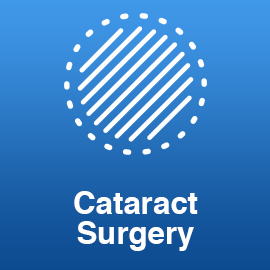
Our eyes are like a camera and see when light enters the eye. We have a natural crystalline lens in our eyes that resembles the one in a camera. This lens focuses light rays coming through the pupil, onto the retina at the back of our eye. There are different parts in the retina that collect this light. Following this, a message is sent to the brain from the retina and this enables us to see.
For good and clear vision, we need the lens to be clear.
When this lens becomes cloudy or opaque, it begins to create obstacles for the light to pass properly. Cataract scatters the rays of light passing through the eye, thus resulting in blurred vision. It is not a growth or a film over the eye, but it is a condition when the natural lens inside your eyes gets cloudy. In most cases, this is related to aging.
Compared to vision with a clear lens, your vision due to a cataract may look fuzzy. Colors might appear dull, and you may experience difficulty in reading signs while driving at night. The symptoms of cataracts are progressive and cannot be corrected with glasses, medicines or contact lenses.
You may experience some or all of the following symptoms if you have developed Cataract.
Advanced Treatment of Cataract with Phacoemulsification/ Laser eye surgery + Foldable Intraocular lenses (Monofocal/ Multifocal/ Accommodative/ Extended depth of focus (EDOF)/Trifocal lenses) is routinely done at BVI. The differences between the various types of lens/implants shall be explained to you during consultation and counseling. Following this best lens/implant suited to your needs will be chosen jointly. More number of patients choose high quality accommodative and trifocal lens/implants in this day and age, as they provide relative spectacle independence at various distances.
Surgery is customized as per the needs and requirements of each individual and carried out using the latest surgical instruments, machines and state of the art operating room, in a caring and compassionate environment by skilled, and highly trained and experienced eye surgeons.

Most people suffering from diabetes can develop changes in their retina over a period of time. There is damage to small blood vessels (capillaries) in their retina, which may leak, causing the retina to develop swelling. Vision can reduce significantly by this swelling (diabetic macular edema).
Another devastating complication that can irreversibly threaten vision is the development of new abnormal retinal blood vessels. These grow in order to replace the ones that close down/function improperly due to diabetes (proliferative diabetic retinopathy). These new retinal blood vessels are unlike the normal blood vessels and have a tendency to bleed within the eye (with the retina and in the vitreous cavity). This can lead to a devastating loss of vision.
BVI specializes in treating patients with retinal diseases, especially diabetic retinopathy. BVI has the distinction of having all the investigation modalities like Spectral Domain High Definition OCT, Fluorescein angiography, and fungus photography under one roof. Advanced treatment with retinal green laser using precision and best in the world laser machines and the latest intravitreal injectable drugs (Lucentis/ Razumab/ Eylea/ Ozurdex) for the medical management of diabetic macular edema and proliferative diabetic retinopathy.
Every week, we operate on a large number of patients who develop serious and visually threatening complications of diabetic retinopathy like tractional or combined retinal detachment. We are among the leading centers in the world, performing sutureless small gauge (23/25/27G) diabetic vitrectomy surgery for these complications in an effort to stabilize or improve vision in such tough situations.
With frequent examination of the retina after full dilation of the pupil, our retinal surgeon can detect retinopathy at an early stage. Hence, it is recommended that there are periodic retinal examinations even if your vision is clear if you have diabetes mellitus.
The retina is the light-sensitive layer, inside the eye that sends visual messages through the optic nerve to the brain. When the retina detaches, it is lifted or pulled from its normal position. If this is not promptly treated, permanent vision loss can ensue.
In some cases, there may be small areas of the retina that are torn. These areas, called retinal tears or retinal breaks, can lead to retinal detachment.
Who is at risk for retinal detachment?
A retinal detachment can occur at any age, but it is more common in people over 40 years in age. It affects men more than women, as observed.
A retinal detachment is also more likely to occur in people who:

Retinal detachment itself is painless. However, warning signs almost always appear before it occurs or has advanced, such as:
At BVI, every type of retinal detachment (simple or complex) is managed using world class surgical equipment like sutureless microincision vitrectomy surgery (MIVS). Our chief retinal surgeon, Dr Piyush Bansal is a highly sought after specialist surgeon to manage these difficult cases. We routinely teach our techniques in various national and international conferences to young and old retinal and eye surgeons.
Retinal surgeries are complex surgeries requiring meticulous precision, strict adherence to postoperative instructions by patients and regular follow up thereafter for the best possible outcome.
Please refer to the information on this website, with regard to preoperative, postoperative instructions to be followed, symptoms and what to expect during and after your retinal surgery.
In eye surgery, different kinds of lasers are used for many reasons which include treating the following:
When is laser used for retinal diseases?
A laser can be focused on the retina in order to spot-weld (stick) layers of the retina together or to destroy part of the diseased retina to prevent it from causing further problems to the unaffected part.
Why is the laser used in retinal tears?
By using laser around the retinal tear, we can reduce the risk of the tear progressing to a full retinal detachment. Essentially the laser ‘spot-welds’ the retina to the deeper layers in the eye, preventing it in most cases from detaching. The laser burns tissues around the retinal tear, resulting in scarring.
Dilated peripheral retinal examination and surgery will be necessary to find all the retinal breaks and seal them and to relieve present and future vitreoretinal traction, or pulling. Without laser or surgery, there is a high risk of complete vision loss.
Why is the laser used in diabetic retinopathy?
In diabetic retinopathy, abnormal blood vessels can leak fluid and reduce vision. The laser can be used in these instances to reduce the leakage. The laser is effective in reducing the risk of blindness in some patients with proliferative diabetic retinopathy. Almost always, you will need several sessions of laser in each affected eye.
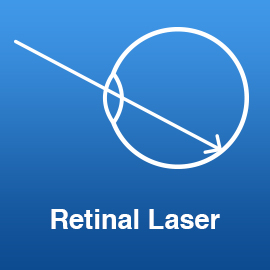
At BVI, we take utmost care for patients with Diabetes and they are seen earlier than others owing to the complex nature of their disease.
Please schedule your laser treatment with us by speaking to one of our front desk executives or with our surgery coordinator.

Age-Related Macular Diseases or AMD is a common eye condition and a leading cause of vision loss among people aged 50 and above. It causes damage to the macula which is a small spot near the center of the retina and the part of the eye needed for sharp central vision, which lets us see objects that are straight ahead.
In some people, AMD advances slowly. Vision loss does not occur for a long period of time. Whereas in others, the disease progresses faster and may lead to a loss of vision in one or both eyes. As AMD progresses, blurring of objects in central vision is a common symptom. Over time, the blurred area might increase in size or you may develop blank spots in your central vision. In addition, objects may not appear to be as bright as they used to be.
AMD by itself does not lead to complete blindness. However, the loss of central vision in AMD can interfere with simple everyday activities, such as the ability to see faces, drive, read, write, or do close work, such as cooking or fixing things around the house.
Who Is at Risk for AMD?
You are more likely to develop AMD if you:
Heart disease and high cholesterol levels are other risk factors for AMD.
Treatment for AMD has evolved over the last 2 decades and at BVI, we take pride in not just helping prevent further vision loss but also improving existing vision to the best vision that is possible.
We are one of the highest volume hospitals and referral centers to treat Age-related macular degeneration with intravitreal anti- VEGF agents like Lucentis, Accentrix, Eylea, Razumab, and Avastin besides intraocular steroid implants.
We are involved in multiple research studies, pushing the frontiers of modern medicine.
Photodynamic therapy and retinal transplant/implant are also offered to our patients with advanced AMD who are not amenable to medical treatment.
Glaucoma is a condition that causes damage to your eye’s optic nerve and gets worse over time. It is often linked to a buildup of pressure inside your eye. Glaucoma tends to be inherited and may not show up until later in the course of the disease.
The increased pressure, called intraocular pressure, can damage the optic nerve, which transmits images to your brain. If the damage continues, glaucoma can lead to permanent vision loss.
Without treatment, glaucoma can cause total permanent blindness within a few years.
Most people with glaucoma have no early symptoms or pain.
In glaucoma, the field of vision decreases so gradually that often the patient does not realize the problem until it is too late.
You need to see us regularly so we can diagnose and treat glaucoma before a long-term permanent visual loss occurs.

There are two main kinds of glaucoma:
Open-angle glaucoma: It is the most common type. Some doctors may also call it wide-angle glaucoma. The drain structure in your eye – called as the trabecular meshwork – looks normal, but fluid doesn’t flow out as it should.
Angle-closure glaucoma: It is less common in the West than in Asia. It is also called acute or chronic angle-closure or narrow-angle glaucoma. Your eye doesn’t drain right because the drain space between your iris and cornea becomes too narrow. This can cause a sudden buildup of pressure in your eye. It is also linked to farsightedness and cataracts, a clouding of the lens inside your eye.
Other types of glaucoma like normal tension glaucoma, congenital glaucoma, secondary glaucoma can present without symptoms at the onset too and require regular examination, early treatment and meticulous follow up.
All Glaucoma patients require a life-long follow-up with their doctor, irrespective of whether they are using medications or have been treated with laser or surgery.
Hence the treatment is initiated only after thorough investigations to decide the best course of treatment for each individual eye.
All investigations (Disc photography, Perimetry, OCT ONH, and RNFL analysis, Goldman Application tonometry) to confirm glaucoma are available at BVI, along with the medicines, lasers, and facility for glaucoma filtration surgery by a super specialist glaucoma surgeon.
The eye is like a camera with a lens in the front and the film (the retina) at the back. The retina converts the ocular image into a signal which is sent to the brain. The central part of the retina, called the macula, is used for straight-ahead vision and for what is in direct line of your sight.
Inside the eyes, the retina does not develop fully in prematurely born babies. Abnormal blood vessels can develop in such a retina. These abnormal blood vessels can cause internal bleeding and even retinal detachment. This is called Retinopathy of Prematurity (ROP). This condition results in low vision or blindness – both of which are irreversible.
At BVI, Retinopathy of Prematurity is treated with laser/anti-VEGF injections/vitreoretinal surgery. After these treatments, the growth of abnormal vessels is slowed down/stopped. It can help in preventing complete vision loss. If treatment with laser or anti-VEGF injections is delayed or in aggressive disease, pars plana vitrectomy might need to be done to provide at least ambulatory vision to these babies.
Screening of all premature babies is recommended before the 30th day of life with a pediatric retina expert/ ROP trained ophthalmologist.

LASIK or Laser-Assisted In-Situ Keratomileusis is one of the most modern surgical procedures for correcting refractive errors like myopia, hyperopia, and astigmatism. Using this technique of refractive error correction, the curvature of the cornea is reshaped using laser. It is capable of removing the tissues with precision up to a micron level. Pre requisites for undergoing refractive surgery are:
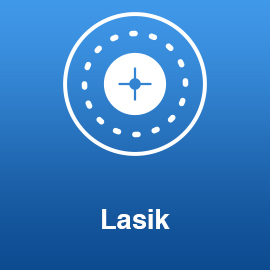
Refractive surgery might be a good option for you if you:
To know more and understand the various surgical procedures available for spectacle removal like PRK, LASIK, Custom LASIK, FEMTO LASIK, SMILE RELEX schedule an appointment by calling front desk or get in touch with surgical coordinator to schedule your pre LASIK consult and counseling.

Uveitis is inflammation of the uvea — the middle layer of the eye that consists of the iris, ciliary body, and choroid, that imparts the brown/blue/green color to your eye.
Uveitis can have many causes, including eye injury and inflammatory diseases. Exposure to toxic chemicals such as pesticides and acids used in manufacturing processes also can cause uveitis.
The type of uveitis you have is classified by where inflammation occurs in the uvea:
Many cases of uveitis are chronic, and they can produce numerous complications, including clouding of the cornea, cataracts, elevated eye pressure (IOP), glaucoma, swelling of the retina or retinal detachment. These complications can result in permanent vision loss.
Uveitis can affect one or both eyes. Symptoms may develop rapidly and can include:
Acute uveitis is treated medically. Some cases may require extensive and meticulous examination and investigative workup due to its chronic, recurrent and difficult nature of the treatment. Please schedule an appointment if you develop any of these symptoms or have diseases/conditions like autoimmune/rheumatological disorders known to be associated with uveitis.

Children, unlike adults, need special care and attention when it comes to eye examination or dealing with an eye condition.
Every child should undergo a comprehensive eye examination before they get enroll in school. There are conditions such as Refractive Error and Amblyopia which can go unnoticed if not tested for specifically at a very early age. Young children who are under the age of 5 years are vulnerable to these kinds of problems as they cannot express their difficulties and concerns. Hence periodic eye check-up is advisable for this age group. It becomes even more essential for children to undergo early screening if they have a family history of eye problems.
Common eye problems seen in children are refractive errors (short and the long sightedness), lazy eye, squint (crooked eye) , congenital droopy eyes, childhood cataract, and congenital glaucoma. They must be medically or surgically addressed at the earliest.
The eye examination must happen at the following intervals:
At BVI, we offer all surgical and medical treatments for pediatric eye diseases. Whether it is spectacle number check-up or something as complex as pediatric retinal surgery, pediatric cataract surgery or squint (crooked eye) surgery.
You will be examined by a team of pediatric optometrists and pediatric ophthalmologist to ensure thorough and complete examination and management of your child’s condition.
Neuro-ophthalmology, a subspecialty of both neurology and ophthalmology, is the treatment of visual problems that are related to the nervous system; that is, visual problems that do not come from the eyes themselves. We use almost half of the brain for vision-related activities.
Although some problems are not worrisome, other conditions can worsen and cause permanent visual loss, or become life-threatening. Sometimes, the problem is confined to the optic nerve or the nervous system and at other times, it is related to a general medical condition.
Neuro-ophthalmology symptoms and conditions:
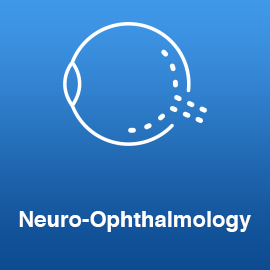
The neuro-ophthalmologic evaluation is one of the most comprehensive examinations you will experience. It may take a few hours to complete. You will be asked to give an account of your current problem and narrate your entire medical history and medication allergies.
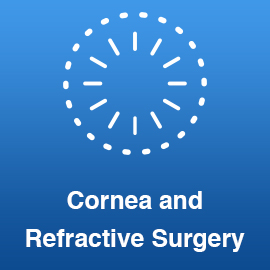
If you have a refractive error, such as nearsightedness (myopia), farsightedness (hyperopia), astigmatism or presbyopia, then refractive surgery is a method of making you spectacle free (FREE OF GLASSES).
There are various surgical procedures that correct or adjust your eye’s focusing ability by reshaping the cornea (the clear round dome at the front of your eye). Other procedures involve implanting a lens inside your eye (ICL/IPCL – implantable contact lens)
The most widely performed type of refractive surgery is LASIK (laser-assisted in situ keratomileusis), where a laser is used to reshape the cornea.

Contact lenses are medical devices worn directly on the Cornea of the eye. Like eyeglasses, contact lenses help to correct refractive errors and perform this function by adding or subtracting focusing power to the eye’s cornea. Contacts provide a safe and effective way to correct vision when used with care and proper supervision. They can offer a good alternative to eyeglasses, depending on your eyes and your lifestyle.
Contact lenses are used to correct the same conditions that eyeglasses correct:
Most people who need vision correction can wear contact lenses. Among the conditions that might keep you from wearing contact lenses are:
While you may feel that droopy eyebrows and upper eyelids are “just part of getting old,” the visual field loss caused by these conditions causes decreased quality of life, restricts visual field, and is potentially dangerous. An oculoplastic procedure is a type of surgery done around the eyes. You may have this procedure to correct a medical problem or for cosmetic reasons.
Oculoplastic procedures may be done on the:
These procedures treat conditions like:

Our oculoplastic and facial aesthetic surgeon is a dual fellowship trained surgeon of international repute. Please schedule an appointment with BVI for any oculoplastic, lid, facial aesthetic requirements (including Botox and Fillers).

"Dr. Piyush Bansal does a thorough checkup of the eyes and suggests the best and effective treatment plan. He makes you feel welcomed and taken care of with his personal attention."

"I had been to Dr. Piyush Bansal for my mother’s eye check-up. Despite his busy schedule, Dr. Piyush Bansal gave us plenty of time and listened to all our queries patiently. He even made my mother understand everything properly and guided her well. Thank you, doctor. Highly recommended!"

"It was a great experience. They were equipped with all the latest technology. Dr. Piyush is very talented. I got all the answers to my problem and the best advice. I am very happy and satisfied with the treatment I got from him. May God bless him always!"

"Bansal Vision Institute is an excellent place to get treatment. I went there for the Cataract surgery. They had advanced equipments and a friendly environment. I would recommend this clinic to everybody!"

"Dr. Piyush Bansal explained the issues well. He didn't make me take unnecessary tests. Very thorough and professional! "

“Best and the most knowledgeable ophthalmologist I have ever met. They have a very homely environment and a great ambience. The experience was really comforting!”

“It is an excellent eye care hospital. They are well equipped with Dr. Piyush having the best surgical skills. He has numerous years of surgical experience.”

“I had a wonderful experience with Dr. Bansal. He is a very compassionate, confident, and ethical practitioner. I had visited him for floaters being a high myopic. His consultation was very reassuring. Highly recommended!”

“They have a state of the art facilities and a very personalized plus professional way of treating the patients. Special note for the Dr. Piyush, please stay the same since your way of communication heals half of the pain.”

"Extremely well qualified, Dr. Bansal is a competent surgeon with an amicable demeanor. Thoroughly recommend this shining star!"

“A very trustworthy person. Dr. Bansal has superb surgical skills and is very passionate about the work he does. Above all, he is a humble personality.”

"A few months ago, my mother had undergone a cataract surgery at the age of 65 years and now she's absolutely happy with her surgery. Thanks doctor!”

“Everyone I dealt with at Bansal Vision Institute was knowledgeable and helpful. Dr. Bansal was so friendly and patient, even when I asked him so many questions that I did not feel rushed at all. They have a really great team.”

“Dr. Piyush is highly experienced, honest, and completely dedicated to his work. He will always put you at ease in the most complicated of eye issues. Steady hand and accurate foresight in medical diagnosis and treatment, he is highly recommended!”
© 2014 - 2021 Copyright with Bansal Vision Institute All rights reserved.